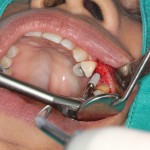
Dental implants are being used increasingly and some implant failures may be due to bacterial contamination at insertion. Prophylactic antibiotic regimens have been proposed to minimise infection. The aim of this review was to address the question, does the use of antibiotics, when compared with a control group, reduce the frequency of implant failure and postoperative infection?
The Medline database was searched together with handsearching of a range of dental journals, British Journal of Oral and Maxillofacial Surgery, Clinical Implant Dentistry and Related Research, Clinical Oral Investigations, Clinical Oral Implants Research, European Journal of Oral Implantology, Implant Dentistry, International Journal of Oral and Maxillofacial Implants, International Journal of Oral and Maxillofacial Surgery, Journal of Clinical Periodontology, Journal of Oral Implantology, Journal of Oral and Maxillofacial Surgery, Journal of Periodontology, Medicina Oral, Patología Oral y Cirugía Bucal, and Oral Surgery, Oral Medicine, Oral Pathology, Oral Radiology, and Endodontology. Only randomised controlled trials (RCTs) were included and study quality was assessed following recommendations of the Cochrane Collaboration.
- 4 trials involving 1002 patients and 2063 implants were included.
- Two studies were considered to have a low risk of bias the other two a high risk
- Antibiotic use reduced the risk of failure ,odds ratio (OR) =0.331 (95%CI; 0.157-0.696)
- The number needed to treat (NNT) to prevent one patient having an implant failure is 48 (95% CI; 31–109).
- Antibiotic use did not significantly reduce the incidence of postoperative infection
The authors concluded
…there is evidence in favour of systematic antibiotic use in patients receiving dental implants, since such treatment significantly reduces implant failure. In contrast, antibiotic use does not exert a significant preventive effect against postoperative infection.
Comment
Although supplemented by a hand search of a wide range of relevant journals the search was limited to a single electronic database.The recent Cochrane review by Esposito et al (2010) also identified 4 RCTs, three of which are included in this review. The authors of this review note that the other study not included in this current review also used plasma rich in growth factors, which was a specific inclusion in this review. The search for the Cochrane review involved 4 electronic databases so it is interesting that the more limited search employed in this review identified all the same RCTs. The Cochrane review indicates that the number needed to treat (NNT) to prevent one patient having an implant failure is 33 (95% CI 17 to 100), based on a patient implant failure rate of 5% in patients not receiving antibiotics. The authors of the Cochrane review concluded
There is some evidence suggesting that 2 g of amoxicillin given orally 1 hour preoperatively significantly reduce failures of dental implants placed in ordinary conditions. No significant adverse events were reported. It might be sensible to suggest the use of a single dose of 2 g prophylactic amoxicillin prior to dental implant placement. It is still unknown whether postoperative antibiotics are beneficial, and which is the most effective antibiotic.
Links
Ata-Ali J, Ata-Ali F, Ata-Ali F. Do antibiotics decrease implant failure and postoperative infections? A systematic review and meta-analysis. Int J Oral Maxillofac Surg. 2013 Jun 25. doi:pii: S0901-5027(13)00258-0. 10.1016/j.ijom.2013.05.019. [Epub ahead of print] PubMed PMID: 23809986.
Esposito M, Worthington HV, Loli V, Coulthard P, Grusovin MG. Interventions for replacing missing teeth: antibiotics at dental implant placement to prevent complications. Cochrane Database of Systematic Reviews 2010, Issue 7. Art. No.: CD004152. DOI: 10.1002/14651858.CD004152.pub3.

[…] Dental Elf- 19th July 2013 – Some evidence that prophylactic antibiotics reduce implant failur… […]